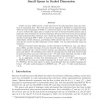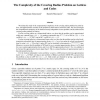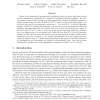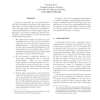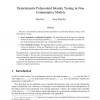COCO
2004
Springer
15 years 5 months ago
2004
Springer
We study the compression of polynomially samplable sources. In particular, we give efficient prefix-free compression and decompression algorithms for three classes of such sources ...
105
click to vote
COCO
2004
Springer
15 years 5 months ago
2004
Springer
Juedes and Lutz (1995) proved a small span theorem for polynomial-time many-one reductions in exponential time. This result says that for language A decidable in exponential time,...
124
click to vote
COCO
2004
Springer
15 years 5 months ago
2004
Springer
We initiate the study of the computational complexity of the covering radius problem for point lattices, and approximation versions of the problem for both lattices and linear cod...
126
click to vote
COCO
2004
Springer
15 years 5 months ago
2004
Springer
Based on the framework of parameterized complexity theory, we derive tight lower bounds on the computational complexity for a number of well-known NP-hard problems. We start by pr...
144
click to vote
COCO
2004
Springer
15 years 5 months ago
2004
Springer
Abstract: Although a quantum state requires exponentially many classical bits to describe, the laws of quantum mechanics impose severe restrictions on how that state can be accesse...
122
click to vote
COCO
2004
Springer
15 years 7 months ago
2004
Springer
In decision tree models, considerable attention has been paid on the effect of symmetry on computational complexity. That is, for a permutation group Γ, how low can the complexit...
116
click to vote
COCO
2004
Springer
15 years 7 months ago
2004
Springer
A source is compressible if we can efficiently compute short descriptions of strings in the support and efficiently recover the strings from the descriptions. A source has high ps...
133
click to vote
COCO
2004
Springer
15 years 7 months ago
2004
Springer
We study the power of quantum proofs, or more precisely, the power of Quantum MerlinArthur (QMA) protocols, in two well studied models of quantum computation: the black box model ...
119
click to vote
COCO
2004
Springer
15 years 7 months ago
2004
Springer
We give a deterministic polynomial time algorithm for polynomial identity testing in the following two cases:
115
click to vote
COCO
2004
Springer
15 years 7 months ago
2004
Springer
We prove a parameterized analog of Schaefer’s Dichotomy Theorem: we show that for every finite boolean constraint family F, deciding whether a formula containing constraints fr...

